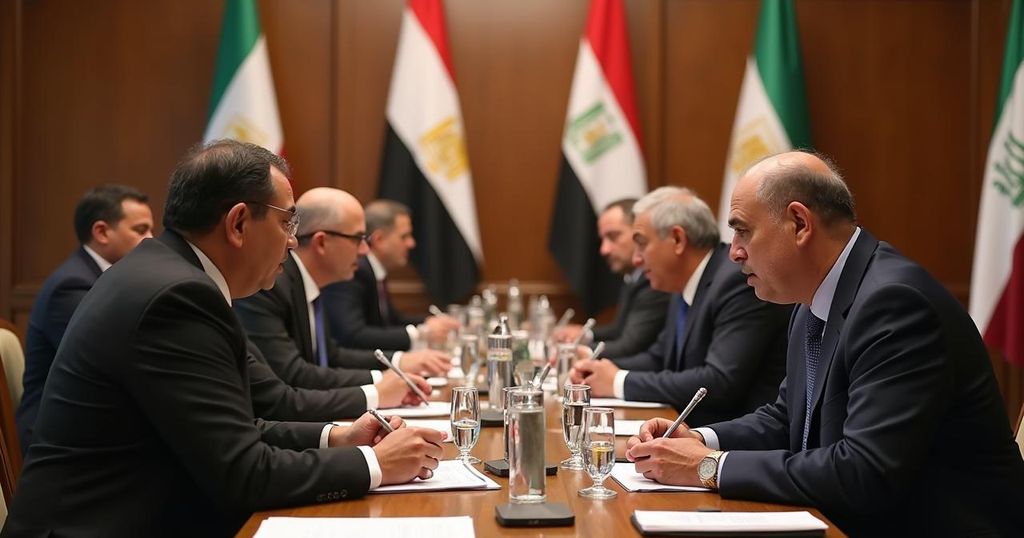Egyptian and Qatari officials convened on October 12, 2024, to discuss strategies aimed at establishing a ceasefire in Gaza, facilitating humanitarian access, and advancing reconciliation efforts between Palestinian factions. They also addressed the escalating situation in Lebanon amidst Israeli military actions, emphasizing the necessity for cooperation and support for national institutions and humanitarian aid.
On October 12, 2024, Egyptian Minister of Foreign Affairs and Immigration Badr Abdelatty engaged in discussions with Sheikh Mohammed bin Abdulrahman Al Thani, the Prime Minister and Minister of Foreign Affairs of Qatar. This dialogue was part of their continued collaboration regarding the recent developments in Gaza and Lebanon. The talks primarily revolved around their collective efforts to establish a ceasefire in Gaza, facilitate the release of hostages, and guarantee the unhindered delivery of humanitarian assistance to those in need. Furthermore, they assessed Egypt’s ongoing initiatives aimed at reconciling Palestinian factions, particularly focusing on recent dialogues between Fatah and Hamas in Cairo, as they strive to unify efforts in the best interest of the Palestinian cause during this pivotal moment. In addition, the ministers addressed the critical situation in Lebanon, highlighting the necessity of a ceasefire amidst ongoing Israeli military actions. They discussed the support required for all Lebanese state institutions, with an emphasis on the Lebanese army, while calling attention to the implementation of UN Resolution 1701 to aid in the deployment of Lebanese forces in southern Lebanon. The urgency of electing a consensus president to bolster the integrity of Lebanon’s national institutions was also a significant topic of discussion. Minister Abdelatty and his Qatari counterpart reiterated the importance of coordinated regional and international efforts to deliver essential humanitarian, shelter, and medical aid to the Lebanese populace, particularly as more than 1.2 million individuals have been displaced as a result of continuous Israeli offensives. They agreed on the imperative of upholding Lebanon’s unity, sovereignty, and territorial integrity, alongside the necessity for the withdrawal of Israeli forces from all Lebanese territories while ensuring the safety of UN personnel within the UNIFIL peacekeeping mission. Moreover, on October 9, 2024, representatives from the Fatah movement and Hamas reconvened in Cairo to discuss the Israeli military actions in Gaza and the pursuit of national unity. A Hamas spokesperson mentioned that these talks aim to address both political developments and the conditions on the ground, with a particular focus on strategies for cooperation following the onset of the Gaza conflict that began on October 7, 2023. This initiative represents a significant advance in efforts to bridge a historical divide that has persisted since Hamas took control of Gaza in 2007.
The article reports on ongoing diplomatic discussions between Egypt and Qatar regarding the urgent need for a ceasefire in Gaza and humanitarian assistance, alongside reconciliation efforts between Palestinian factions Fatah and Hamas. The context includes the broader regional implications of the Israeli military activities in both Gaza and Lebanon and the cooperative strategies necessary for addressing these crises and preceding historical divides. The recent escalation in violence, beginning in October 2023, further complicates the already fragile political landscape, necessitating urgent measures for peace and humanitarian relief.
In conclusion, the discussions between Egypt and Qatar underscore the critical need for immediate humanitarian action and conflict resolution to address the dire circumstances in Gaza and Lebanon. The emphasis on Palestinian reconciliation and the commitment to a ceasefire reflect a broader regional intent to stabilize the situation and pave the way for long-term peace and unity. The ongoing collaborative efforts highlight the significance of coordinated regional and international response to the challenges faced in this geopolitical context.
Original Source: www.egypttoday.com







